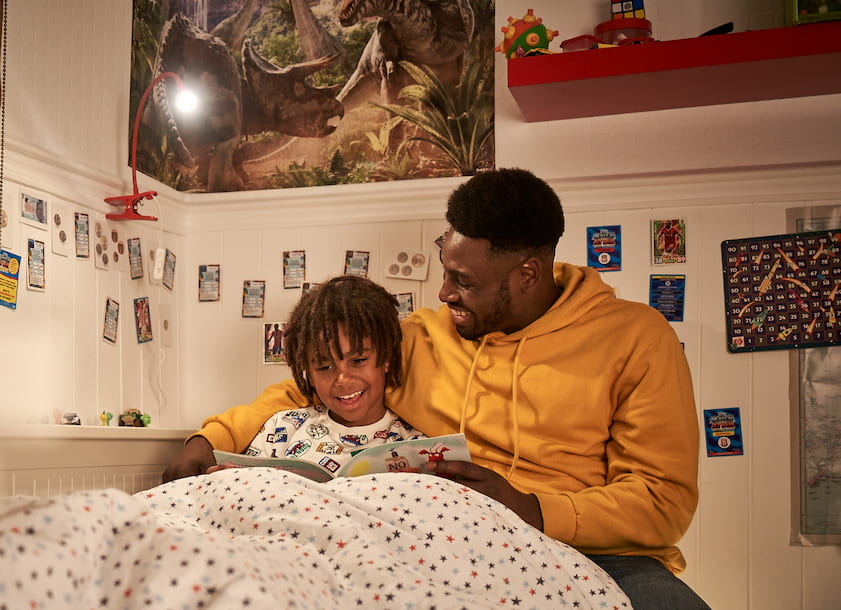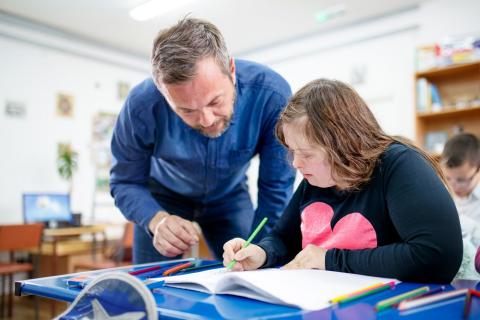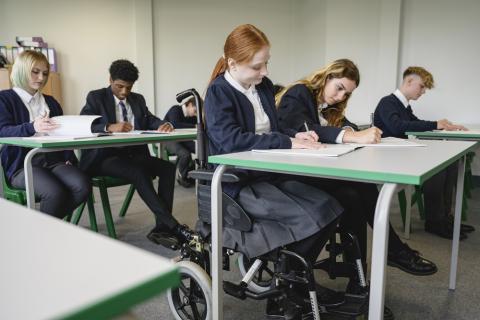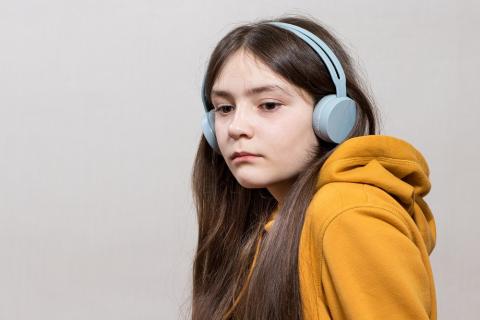Everybody’s brain works in a slightly different way. We all find some things easy and some things difficult, from how we learn to how we interact with others, and this varies from person to person. However, for some people the difference between the things they find easy and the things they find hard is more pronounced, because of the way their brains work.
This is the case for people who are autistic, or have ADHD, dyslexia, dyspraxia, dyscalculia, dysgraphia or Tourette’s Syndrome, all of which are included under the ‘umbrella’ of neurodivergence. It’s a good idea to talk to your child about these differences, to help them be more accepting and understanding of people who are different from them.
Here you’ll also find information on how to spot the signs that your child’s brain may work in a different way and how you can talk to them about this and get any support they may need to help them flourish.
What is neurodiversity and neurodivergence?
The brains of neurodivergent people are ‘wired’ differently to the majority of other people (‘neurotypical’ people). This means they see and experience the world in a different way – and this can make things difficult because the world is often designed for ‘neurotypical’ people and doesn’t account for the way neurodivergent people experience things.
Neurodivergence isn’t a mental health condition or disability – it’s a cognitive difference. It doesn’t need to be ‘cured’. However, neurodivergent people may need some adjustments made to their environments to help them flourish. For example, some neurodivergent children may need more peace and quiet to concentrate than their friends at school, or may need a bit more time to do work or to take more breaks, and may find a noisy, busy, brightly lit classroom a challenging environment to learn in.
What are the common signs of neurodivergence?
Every neurodivergent person is of course different, and different conditions have different signs. But there are some common signs. Some of these can make life difficult, but others are strengths. These include:
- difficulty picking up social cues and communicating in social situations
- problems with speech and language
- physical tics or behaviours, like rocking
- sensitivity or insensitivity to light, sound, heat, crowds or other stimuli
- a strong preference for routine and dislike of change
- difficulty focusing or, on the other hand, having extremely good powers of concentration
- innovative thinking
- close attention to detail
- a heightened ability to recognise patterns, often leading to strong skills in music and technology.
Why is it important to talk to children about neurodiversity?
Just as it’s important to talk to children about how people and families come in all sorts of shapes and sizes and colours, it’s also important to let them know that people can think and feel in different ways too. And it’s never too early to start talking about this together. The more they know about the differences between us, the more they can come to understand and accept other children and adults who aren’t like them. This can help prevent them from making hurtful comments and reduce problems like bullying.
Tips for talking to children about neurodiversity
Tip #1: Talk to them positively about difference

You can start by talking to your child about the things they’re good at and the things they struggle with, and explaining how this is different for everyone. And wouldn’t it be boring if we were all the same – if we were all brilliant at football but no good at baking there’d be no more cake!
Tip #2: Talk about how everyone learns differently
It’s good for children not just to learn but to think about how they learn. Everyone learns in a slightly different way – some people like to hear things read out loud, while others would rather read to themselves, look at diagrams or watch a video. Some people like to draw mindmaps or pictures while others will make lists. Encouraging your child to think about what they like to do will help them understand that there’s no right or wrong way to learn.
Tip #3: Explain the difference between fairness and ‘the same’
Sometimes when children see other children being treated differently to them they may think this isn’t fair. Why is one child allowed a time out from class when they’re not?
So it’s a good idea to talk to them about how ‘fairness’ doesn’t always mean everybody being treated in the same way or given the same things. Some people need more of a boost to get to the same level as everyone else, just as they might need a boost to reach something on a high shelf where an adult wouldn’t.
Tip #4: Watch programmes and read books that celebrate diversity

Reading books and watching programmes online or on TV that celebrate diversity is a great way for children to learn more about the world, and offers you a chance to start a conversation about difference. You can find lots of ideas for younger kids on the Love Reading 4 Kids website while the Scottish Book Trust have ideas of books for 9-11 year olds and books for 12-14 year olds.
Tip #5: Talk about being kind and understanding
Remind them that everyone is good at some things and not so good at other things, and it’s not nice to tease or make fun of someone who’s struggling. Instead, saying something kind may help them feel much better.
I think my child might be neurodivergent – what should I do?
People don’t become neurodivergent – they’re born that way. But sometimes it can take a while for the signs to appear. Some children will even mask the signs in order to fit in with their friends. If you suspect your child may be wired differently to others, your first port of call should be your GP or, if your child’s at school, their teacher, to see what they think.
You can find out more about neurodivergent conditions and where to get support on this page. You can also download resources relating to all these conditions from the Neurodiversity Week website here.
Autism
Autism is a neurological difference: autistic brains work differently to non-autistic brains. They see and experience the world differently to non-autistic people. You can find out more about autism at NHS Inform and on the Different Minds website.
Scottish Autism provide information, advice, and a range of support services across Scotland for autistic individuals and their families.
You could also take a look at the Autism Toolbox, a free online resource developed to support the inclusion of autistic learners in Scottish Early Learning and Childcare settings, Primary and Secondary schools.
It can make a big difference if neurotypical people are aware of, understand and accept the different communication styles between autistic and non autistic people. To find out more, take a look at the Autism and the Social Rulebook, an eBook on the Different Minds website. It was written and created in partnership with autistic adults and gives an insight into the differences between autistic and non autistic communication styles. We all communicate differently, and that’s ok.
ADHD (attention deficit hyperactivity disorder)
ADHD affects concentration and behaviour. Symptoms include inattentiveness, hyperactivity and impulsiveness. Many children go through phases where they're restless or inattentive – this doesn't necessarily mean they have ADHD. However, you should consider talking to your child's teacher or your GP if you think their behaviour may differ to most other children their age.
You can find out more about ADHD at NHS Inform and on the YoungMinds website.
ADHD UK also offer information and support.
There may be a local ADHD support group in your area – you can search for a group near you on the Scottish ADHD Coalition.
NHS Scotland and SilverCloud offer free courses to help you boost your wellbeing and mental health, and support your children too. Their Supporting a child with ADHD programme is designed for parents and carers of 6 to 12 year olds who’ve been diagnosed with ADHD or are waiting for an ADHD assessment. You can find out more about the course here and sign up for free using the code Scotland2020.
Dyslexia
People with dyslexia find things like reading, writing and remembering things more difficult. However, dyslexia also comes with many strengths, like creativity and good problem solving skills.
Dyslexia Scotland’s website includes information on the range of support and advice services they offer to parents or carers of children and young people with dyslexia.
Dyspraxia
Dyspraxia (also known as developmental co-ordination disorder or DCD) affects a person’s ability to perform movements in a smooth, coordinated way. It may also affect speech, time management and planning and organisational skills. You can find out more about the signs and what to do if you notice them in your child at the NHS website.
Dyscalculia
People with dyscalculia find maths and arithmetic more difficult. Children with dyscalculia learn in a different way, so they can still be taught to do maths but in a way that suits them, which is different from the way maths is usually taught at school. You can find out more at the Dyscalculia Information and Addressing Dyslexia websites.
Dysgraphia
People with dysgraphia find writing particularly difficult. For example, they’ll mix up lower case and upper case letter and have problems with spacing and letter shapes. Like dyslexia and dyscalculia, children and adults with dysgraphia aren’t any less clever than people without these conditions, but may well need extra help at school. You can find out more on the National Handwriting Association website.
Tourette's syndrome
Tourette's syndrome causes you to make involuntary sounds and movements called tics. They usually appear in childhood between the ages of 2 and 14 (around 6 years is the average). Many children have tics for several months before growing out of them, so a tic does not necessarily mean they have Tourette's syndrome. You can find out more about Tourette’s syndrome on the NHS website and get help and support at Tourette's Action.
My child has been identified as neurodivergent – how do I explain it to them?
If your child is identified as neurodivergent they find may find this confusing or upsetting. Here are some tips for talking to them about it.
Tip #1: Pick your moment
Like all challenging conversations, there’s no right or wrong time to talk to them about this, but choosing a calm, quiet moment when you have plenty of time to answer their questions will help. And let them know that they can always come to you with any questions or concerns later on – our page on encouraging your child to confide in you has more tips for talking and listening that may help.
Tip #2: Create a relaxed atmosphere by doing an activity together

Sometimes it’s easier to talk while you’re doing something else, so it may help to do an activity together that you both enjoy, like baking, drawing or dancing. The YoungMinds website has some good ideas for activities you could try, as well as conversation starters and tips for supporting your child.
Tip #3: Focus on their abilities
Your child may not like the idea of being different to other children in their class or getting ‘special’ treatment. So rather than talking to them about why they’re different, you could try focusing on the things they can do. For example, are they good at drawing, or running, or singing? If they’re worried or frustrated that they ‘can’t do anything’ because they find some things harder, remind them that everyone has different talents.
Tip #4: Talk about famous people who are neurodivergent
Being neurodivergent doesn’t have to hold you back – for some people it’s helped them succeed. Talking about well-known people who are neurodivergent (like Greta Thunberg, who sees her autism as a ‘superpower’, or Billie Eilish, who has Tourette’s syndrome) can help your child realise how special they are. You can find lots of examples of neurodivergent celebrities on the Neurodiversity Week website.
Tip #5: Watch programmes and read books that celebrate diversity
Children like to see themselves reflected in the books they read and films and series they watch, so reading and watching things that celebrate neurodiversity will help them feel that they’re not alone and are part of something bigger. You can find lots of ideas for younger kids on the Love Reading 4 Kids website while the Scottish Book Trust have ideas of books for 9-11 year olds and books for 12-14 year olds. You could also try reading these comics from Neurodiversity Week together.
How can I ensure my child gets the help and support they need at school?
Children have a legal right to get additional support at school if it’s needed. Whatever your child’s needs and whenever they arise, everyone involved should try to identify them as early as possible and provide them with the support they need. If you have any concerns about how your child is getting on at school or you feel that they need extra help with their learning, the best thing to do is raise this with your child’s teacher as soon as you can.
You can also get more information about additional support needs, and confidential advice on your rights and entitlements, through Enquire.
Resources such as the Autism Toolbox and the Addressing Dyslexia Toolkit have been designed to help staff support neurodiverse children and young people’s learning.
Our page on additional support for learning has more information, and you can also find out more on the Parentzone Scotland website.
What if my child’s being bullied because they’re neurodivergent?
If you’re concerned that your child may be being bullied, try and talk to them about it – and to listen to what they have to say. Our section on bullying has more information and advice.
 Activities & Play
Activities & Play Behaviour
Behaviour Childcare
Childcare Development & Growing Up
Development & Growing Up Family, Friends & Relationships
Family, Friends & Relationships Feeding Your Baby
Feeding Your Baby Food & Eating
Food & Eating Health & Safety
Health & Safety Mental Health & Wellbeing
Mental Health & Wellbeing Money & Work
Money & Work Online Behaviour & Safety
Online Behaviour & Safety Pregnancy & First Days
Pregnancy & First Days School & Education
School & Education Sleep
Sleep













 Behaviour
Behaviour
 Sleep
Sleep